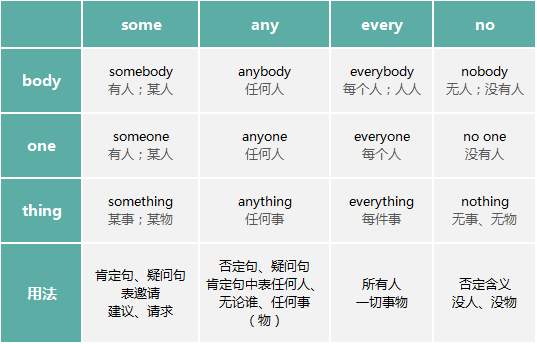基础代词学习→【基础篇】代词(第二部分)
Composite indefinite pronouns
由some,any,no,every分别加上-one,–body,–thing构成的不定代词叫做合成不定代词或复合不定代词。这些复合代词具有名词性质,在句中可用作主语、宾语或表语。
(1)复合不定代词在句中充当主语、宾语、表语;做主语时,谓语动词用单数。
Everything begins to grow when spring comes.(作主语)
春天来临时,万物开始生长。
Everybody is here except Tom.(作主语)
(2)形容词修饰不定代词要后置。

There is nothing wrong with my car.
I have something important to tell you.
我有重要的事情要告诉你。
(3)something,somebody,someone通常用于肯定句;anything,anyone,anybody通常用于否定句、一般疑问句或条件状语从句中。
He found something strange but interesting.(肯定句)
他发现了一些奇怪但有趣的东西。
Do you have anything to say ?(一般疑问句)
你有什么要说的吗?
I didn’ t meet anybody on the island.(否定句)
(4)在疑问句中,表示邀请、请求、建议,希望得到对方肯定回答时,用something,somebody,someone.
Would you like something to drink/eat?
Why not ask someone to help you?
为什么不请人帮你?
(5)肯定句中,anything在表示“任何事(物)”,anyone,anybody表示“无论谁,任何人”
任何事情都可以。
Anybody knows the answer.
任何人都知道答案。
I would like to do anything for you.
1.“not every–”表示的是部分否定,意为“并非都,不都”。
Not everything will go well.
并非所有事情都会进展顺利。
2.“not any–”和no–均表示全否定
He listened, but heard nothing.= He listened, but didn’ t hear anything.
他听着,但什么也没听到。
1. I’m hungry. I want ______ to eat.
根据句意,“我饿了,我想吃点东西。”在肯定句中,表示“一些东西”通常用something。
2. —Do you have ______ to say for yourself?
—No, I have ______ to say.
A. something; everything B. nothing; something
C. everything; anything D. anything; nothing
句意是“—你有什么要为自己辩护的吗?—不,我没什么可说的。” 在问句中使用anything表示“任何事情”,而在答句中,nothing表示“没有任何事情”。
3. Why not ask ______ to help you?
句子意思是“为什么不去找人帮你呢?” 在肯定句中,someone意为“某个人”,表示建议或期望得到肯定回答。
4. Everything ______ ready. We can start now.
A. are B. is C. be D. were
“一切准备就绪。我们现在可以开始了。”不定代词everything作主语时,谓语动词应使用单数形式is。
5. There’s ______ with his eyes. He’s OK.
A. anything wrong B. wrong something
C. nothing wrong D. wrong nothing
句意为“他的眼睛没有问题。他没事。” 形容词修饰不定代词通常放在不定代词后面,故正确答案是nothing wrong。
6. She listened carefully, but heard ______.
句子表达的是“她仔细听,但是什么也没听到。”nothing表示“什么都没有”,符合题意。
7. I agree with most of what you said, but I don’t agree with ______.
A. everything B. anything
句意是“我同意你说的大部分内容,但我并不完全同意所有的事。” not everything 表示部分否定,即并非所有的事情都同意。
8. — The exam was difficult, wasn’t it?
— No,but I don’t think______ could pass it.
句子对话是“—考试很难,不是吗?—不,但我认为并不是所有人都能通过。”everybody与否定词not结合,表示“并非所有人”,即不是所有人都能通过考试。


